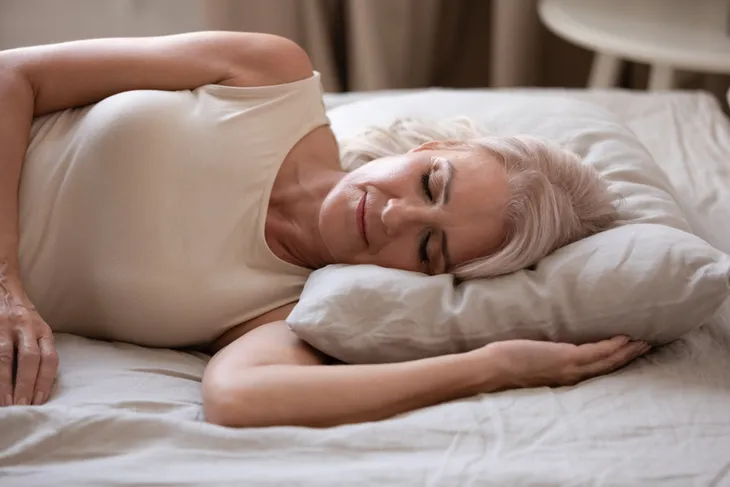Physical exercise and a healthy diet are not the only things vital for good health. Sleep is very important too. More important than you might know. Sleep is crucial for your health as it helps your body repair itself. For example, sleep helps heal and repair your heart and blood vessels, aids in muscle recovery, will help you feel rested and productive for the next day, and more.
Unfortunately, many factors can disrupt your sleep from the foods you eat to your sleeping environment. This can lead to sleep deprivation which can have negative consequences on your health. Follow along as we explore reasons why seniors need better sleep. We’ll also cover how much sleep you actually need, and tips to help you get better sleep in the future.
What Is Sleep Deprivation and Why Is High-Quality Sleep Important for Seniors
There can be many things that prevent you from getting the sleep you require. However, consistent poor quality sleep can lead to sleep deprivation. This can occur if you don’t get enough hours of sleep, you sleep at the wrong time of day, or if you don’t get good quality sleep.
Sleep deprivation can have serious consequences throughout your day from physical function to loss of productivity and more. This is why high-quality sleep is so important for seniors. Next, let’s explore exactly what sleep does for your body.
Sleep Can Boost Your Mood
The quality of sleep you get can play a role in your mental health. Poor sleep is linked to mental health issues such as anxiety and depression. In fact, Healthline states, “It’s been estimated that 90% of people with depression complain about sleep quality.”
Further, people who suffer from sleeping disorders such as obstructive sleep apnea or insomnia also reported higher rates of depression compared to those who don’t. As you can see, getting high-quality sleep is detrimental to your mental well-being.
Sleep Supports Brain Health
Sleep is very important for brain health. When you are sleep deprived, your cognitive function, concentration, productivity, and daily performance can all be negatively impacted.
In contrast, high-quality sleep can help improve memory as well as problem-solving skills. Along with sleep, there are plenty of other ways you can support your brain. Check out these tips on how seniors can boost brain health!
Sleep Can Help Manage Your Weight
Are you gaining weight and can’t find the root cause? Or perhaps you’re having trouble maintaining your weight. Whatever the case may be, poor sleep could be what’s preventing you from achieving your goal weight.
Healthline explains, “Studies show that sleep-deprived individuals have a bigger appetite and tend to eat more calories.” Further, sleep deprivation can also disrupt your appetite hormones by increasing your levels of ghrelin (the hormone that stimulates appetite) and reduces the levels of leptin (the hormone that suppresses appetite).
With this in mind, if you’re trying to lose weight, or maintain your current weight, make sure you are getting high-quality sleep. For more ways to manage your weight, check out these weight loss tips for seniors and effective weight loss exercises.
Sleep Can Help Lower Your Risk of Diseases
Sleep deprivation can also put you at a greater risk for developing serious health conditions such as heart disease, diabetes, and high blood pressure. Let’s dive into this deeper.
When you’re experiencing sleeping problems, your blood pressure will stay higher for a longer period of time. And high blood pressure is one of the leading causes of heart disease and stroke thus putting you at a greater risk.
Further, studies have shown that getting high-quality sleep can also help your body control blood sugar levels. In turn, your risk for diabetes can decrease too. If you want to take control of your health, and want to help prevent these serious health conditions then it’s time to get better sleep!
Sleep Can Help Improve Immune Function
The immune system plays a vital role in protecting your body from harmful substances, viruses, and cell changes that have the potential to make you sick. Sleep deprivation can impair your immune function and in turn, make you more susceptible to illness.
In a large two-week study, a group of individuals was monitored to see how sleep can affect the chances of developing a cold. Healthline explains, “They found that those who slept less than 7 hours were almost 3 times more likely to develop a cold than those who slept 8 hours or more.“
Unfortunately for seniors, the immune system tends to weaken with age. This is why taking care of your immune function is of the utmost importance! To protect your immune health make sure you get high-quality sleep. For more tips, check out these healthy habits that can boost your immune system!
Sleep Can Help Decrease Inflammation
Sleep can affect inflammation in your body. If you’re not getting enough high-quality sleep, it could lead to inflammation, especially in the digestive tract, and may even cause disorders such as inflammatory bowel disease.
Furthermore, chronic inflammation is harmful to the body because, over time, the body’s inflammatory response can begin damaging healthy organs, cells, and tissues. Eventually, this could lead to DNA damage, internal scarring, and decreased tissue which is all linked to diseases such as cancer. To help decrease inflammation in the body make sure you get high-quality sleep.
Sleep Enhances Muscle Recovery
There are many benefits of regular exercise for seniors from maintaining strong joints and heart and lung health, to maintaining chronic conditions and building muscle. In fact, regular physical activity is one of the most important things seniors can do for their health. An important part of exercising is muscle recovery. This allows the fibers in your muscle to heal stronger than they were before, and ultimately resulting in stronger muscles.
Sleep can enhance muscle recovery through protein synthesis as well as human growth hormone release. In contrast, poor sleep can interfere with your body’s ability to recover after a workout and this is why exercising and sleep go hand in hand.
How Much Sleep Do Seniors Really Need
So now that we know all the reasons why you need high-quality sleep, you might be asking yourself, how much sleep do I need anyway? The Centers for Disease Control and Prevention (CDC), states that seniors age 61 to 64-years should aim to get 7 to 9-hours of sleep while seniors age 65 years and older should get between 7 to 8-hours of sleep.
Keep in mind, the amount of sleep you get each day is important, but so is the quality of sleep you get. High quality sleep means that you’re sleeping about 85-percent of the total time spent in bed, that you’re able to fall asleep within 30-minutes or less, waking up no more than once per night, and remaining awake for 20 minutes or less before falling back to sleep.
There are several things you can start doing that can help you get more sleep and better sleep. Let’s explore that next.
Sleeping Tips for Seniors
Firstly, if you’re experiencing chronic sleep deprivation it’s time to speak with your doctor to determine the root cause. Next, assess your environment to determine if there are changes you need to make.
To improve your quality of sleep, your sleeping environment should be calm, inviting, and relaxing. It would be best to avoid electronic devices like televisions, tablets, and mobile phones in the bedroom or at the very least, avoid being on these devices at least an hour before bed.
Other sleeping tips that might help are reading before bed, having a warm bath or shower, or any other ways you like to unwind. Finally, to improve the amount of sleep you get, try your best to stick to a sleep schedule. You may also need to start your nighttime routine earlier to get more sleep. With all of these best practices, you’ll be well on your way to getting more and better sleep!
To learn more, check out these sleeping tips for seniors!













